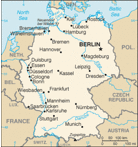|
|
Illinois Institute of Technology
MTCC Room 106
Chicago, IL 60616
+1 312.567.3680
studyabroad@iit.edu
|
|
|






|
|
|
|
|


Quick Facts
Population: 81305856
Capital: Berlin
Per-capita GDP: $ 38400
Size: 357022 km2
Time Zone: (GMT + 01:00 hour) Brussels, Copenhagen, Madrid, Paris
US State Department
Travel Warning: YES
See :
Country Specific Info.

|
|
|
|